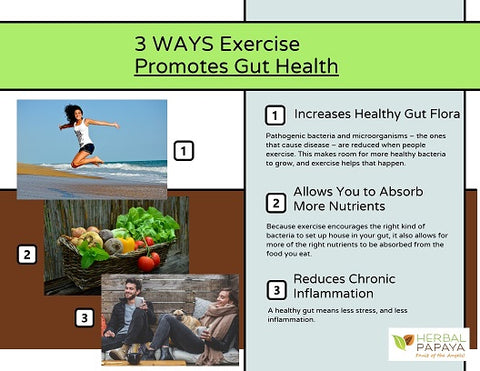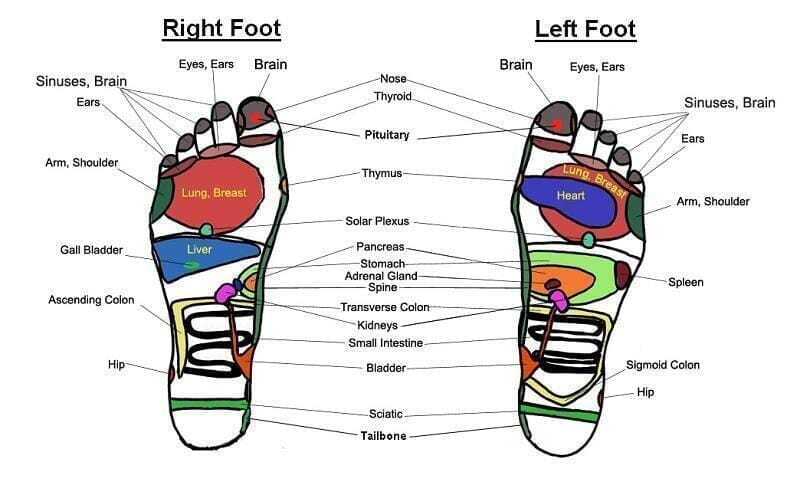3 Ways Exercise and Your Gut Health are Linked | Herbal Goodness
If you want yet another good reason to hit the gym, we’ve got one for you.
Exercise promotes healthy gut flora. [1]
Your gut is linked to so many aspects of your health, we could write a book on it, but since there have already been many books written on the subject, we’ll just summarize some of the scientific findings for you to make life easier – after all, you’ve got some weights to lift, or a mile or two to run! [2]
You may already know that eating a pre-biotic diet, supplementing with high-quality papaya seeds or papaya seed extract, and probiotics can also support your microbiome, but exercise does the trick, too.

Here’s why:
Your gut maintains an important force against disease, regulates homeostasis in your body, provides nutrients to your cells, participates in the signaling network (called the gut-brain axis), and regulates epithelial cell development which affects your immune system.
And a good hour-long workout, whether it is a swim at the pool, a jog around the neighborhood, ballroom dance lessons, or the latest H.I.I.T workout are all going to promote those functions in your body.
Regular exercise may even be as important as diet and supplementation to maintain good gut health. [3]
- Exercise increases the healthy bacteria in your gut. Your gut is a unique combination of over 100 trillion microorganisms that is determined at birth, and influenced by your DNA. Some of the microorganisms are helpful. Some are harmful, and some are symbiotic, meaning that they are neutral. Pathogenic bacteria and microorganisms – the ones that cause disease – are reduced when people exercise. This allows healthy bacteria to colonies your gut, and therefore boost your gut health. [4]
- Exercise allows you to absorb more nutrients for the foods you eat and choose better foods. Because exercise encourages the right kind of bacteria to set up house in your gut, it also allows for more of the right nutrients to be absorbed from the food you eat. Our gut flora also has a direct connection to food cravings, so exercise helps to reduce bad food cravings so that we crave more nutrient-dense foods. [5]
- Exercise reduces stress and chronic gut inflammation. There is already loads of research suggesting that exercise reduces inflammation throughout the body, but it may be indirectly promoting lower stress levels and reduced inflammation of the gut, specifically. Our gut flora communicates with our brain to tell us when we feel at –ease or when we need to enter a fight-or-flight state.
This results in a chemical cascade. Either our bodies will dump cortisol, norepinephrine and adrenaline, and other stress hormones into our bloodstream or it will release happy hormones like serotonin, GABA, and oxytocin. Some even call the gut the “neglected endocrine system,” meaning that it is more in control of our hormones that we might ever have imagined.[6]
Since higher levels of cortisol are linked to inflammation, and exercise reduces cortisol levels, exercise is like a one-two punch for stress, depression, anxiety, and inflammation.[7]
Summing it Up
If you want great gut health, get plenty of exercise, take probiotics, and use quality gut-supporting supplements. Your whole body will thank you.
References:
[1] Monda, V., Villano, I., Messina, A., Valenzano, A., Esposito, T., Moscatelli, F., … Messina, G. (2017). Exercise Modifies the Gut Microbiota with Positive Health Effects. Oxidative Medicine and Cellular Longevity, 2017, 1-8. doi:10.1155/2017/3831972
[2] The Microbiome. (2017, August 24). Retrieved from https://www.hsph.harvard.edu/nutritionsource/microbiome/
[3] Want to Improve Your Gut Health? Regular Exercise Is Key. (17, July 27). Retrieved from http://observer.com/2017/07/gut-health-micobiome-regular-exercise/
[4] Krajmalnik-Brown, R., Ilhan, Z., Kang, D., & DiBaise, J. K. (2012). Effects of Gut Microbes on Nutrient Absorption and Energy Regulation. Nutrition in Clinical Practice, 27(2), 201-214. doi:10.1177/0884533611436116
[5] Norris, V., Molina, F., & Gewirtz, A. T. (2012). Hypothesis: Bacteria Control Host Appetites. Journal of Bacteriology, 195(3), 411-416. doi:10.1128/jb.01384-12
[6] Minireview: Gut Microbiota: The Neglected Endocrine Organ | Molecular Endocrinology | Oxford Academic. (2014, August 1). Retrieved from https://academic.oup.com/mend/article/28/8/1221/2623221
[7] Cortisol — Its Role in Stress, Inflammation, and Indications for Diet Therapy. (n.d.). Retrieved from http://www.todaysdietitian.com/newarchives/111609p38.shtml
Related: Everything You Ever Wanted to Know About the Paleo Diet










